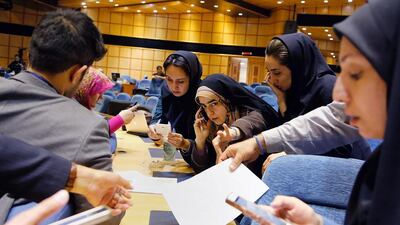Abu Dhabi // Iranian reformists were on track Sunday to sweep parliamentary seats in Tehran and make gains in the rest of the country, in elections widely seen as a referendum on the current administration’s successful nuclear negotiations and the lifting of crippling sanctions.
President Hassan Rouhani championed the nuclear talks in the face of hardline resistance, and has pushed for a far-reaching economic and political opening to the west that has been similarly denounced, and the election results could help empower his pragmatic policies.
“The people showed their power once again and gave more credibility and strength to their elected government,” Mr Rouhani said.
Mr Rouhani and Akbar Hashemi Rafsanjani, a former president and influential reformist, were also both on the verge of winning seats to the Assembly of Experts, an 88-member clerical body with an eight-year term that could choose the successor of current supreme leader Ali Khamenei, 76, if his health fails.
Twenty-eight clerics stood for election to one of Tehran’s 16 assembly seats, and the pair’s allies were in the lead to take all of those seats with a third of the votes counted.
Mr Rafsanjani, who maintained cordial relations with Gulf Arab leaders during his two terms in office between 1989 and 1997, took to social media on Sunday to laud his camp’s gains and send an implicit message to hardliners perhaps to pre-empt any attempts to challenge the results. “No one is able to resist against the will of the majority of the people and whoever the people don’t want has to step aside,” he posted to Twitter.
It appears likely no single political bloc – reformists, independent conservatives and hardliners – will dominate the incoming parliament, which hardliners had controlled with 65 per cent of the seats. The independents have supported Mr Rouhani during his tenure in office, however, and could give majority support to his policies.
Based on the early results, Reuters predicted independents would take 44 seats, reformists 79 and hardliners 106. Final results are expected to be announced on Monday.
Reformists lost their parliamentary majority in 2004, and have been sidelined since, holding only 20 seats in the current parliament. Their political power reached a nadir after the disputed 2009 reelection of hardliner Mahmoud Ahmadinejad that led to accusations of rigged results and a violent crackdown on the reform movement.
The appointed Guardian Council of clerics, that is a check on the parliament and which vets election candidates, disqualified 40 per cent of the more than 12,000 candidates, the vast majority of them reformists.
But this election could mark a political turning point for the Islamic republic in its relations with the West and for internal reforms, and would be a clear endorsement of the direction of the country under Mr Rouhani, particularly by young Iranians, who make up 60 per cent of the population, desperate to end their country’s global isolation.
While the economy has not yet felt any significant boost, western leaders and business executives have been meeting with Iranian counterparts since the implementation of the nuclear deal, eager for their countries to reap the benefits of a market of 80 million that has been previously unavailable.
US president Barack Obama has said he hoped the nuclear deal would lead to increased sway for moderates inside Iran, and the election results would also give a boost to his argument, which critics have dismissed by pointing to the immediate financial windfall that would likely allow Iran’s Revolutionary Guards to increase their support to proxy and allied forces across the Middle East.
While the West’s relations with Iran, as well as those of Asian countries, are on an upward trajectory, it is yet to be seen whether the moderates will have any increased influence on foreign policy or if they would even seek to improve relations with Iran’s Gulf Arab rivals. So far, there have only been signs of deterioration between Tehran and Riyadh, its rival for regional power.
tkhan@thenational.ae

